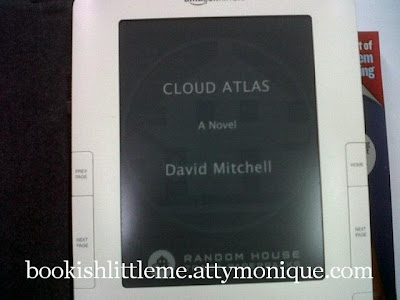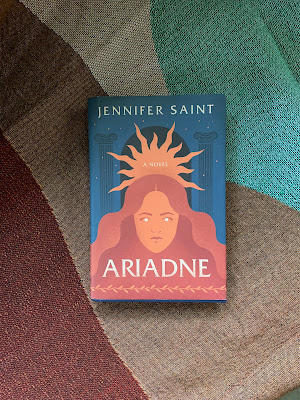Cloud Atlas
by David Mitchell
When asked what this book is about, Aldrin, my bookish friend who recommended it (and kindly provided a digital copy, as well) to me replied that it was like the Inception of books. (You know, that awesome movie with Leonardo di Caprio?) While I was intrigued by this description, I put off reading the novel in favor of other titles that I found more interesting at the time. It is too late to regret that decision, yes, but finally reading this wonderfully brilliant work is most rewarding.
Cloud Atlas is akin to an anthology of short stories but, at the same time, it is not – it is a sort-of anthology because it is comprised of six stories spanning centuries in between, all about the lives of six different characters/personas. On the other hand, it isn't an anthology because structurally, each character's story is closely intertwined with the one that comes before and after it. Six degress of separation? Could be. It reminded me a lot of the structure of Jennifer Egan's Pulitzer-winning A Visit From The Goon Squad, which got me thinking if the latter was somehow patterned from David Mitchell's masterpiece.
Plot-wise, Cloud Atlas is an inspired, clever, and original work. It is such an intelligent work that, in my opinion, can only be truly appreciated if one goes beyond form and attempt to imbibe the substance. There were parallelisms injected throughout the storyline, and the writing style varied in accordance with the character and time setting. Moods and atmospheres changed, too, made to adapt to every story's setting. A writer who has the capability not only to come up with such novel ideas but actually execute them as well – and brilliantly at that – can only be called a genius.
I only ever get to gush and rave about books that I found so satisfying, like I did with Never Let Me Go and Middlesex, and this is one of those times.
Let me try to put my thoughts down per story.
The Pacific Journal of Adam Ewing – Adam Ewing is an American notary who is making the voyage by sea from the Chatham Isles back to his California home. His story is set in 1850. In terms of readability, this was the most difficult to get into primarily because of the old English utilized by Mitchell for the narration. I will admit that it was a tad boring, too, because of the seemingly meandering stories about the New Zealand aborigines/tribes that Ewing spoke of. But once past this chapter (or at least the first part of it), it gets better. I promise.
Letters From Zedelghem – Robert Frobisher, a young English musician, travels to Belgium to be the amanuensis of the once-great and now-blind Ayrs. Frobisher writes letters to his friend, Rufus Sixsmith, about his short stint in Chateau Zedelghem. Set in 1930s Europe, Frobisher's story was the one fraught with romance, lust, and despair.
Half-Lives: The First Luisa Rey Mystery – Set decades later, in the 1970s, in Buenas Yerbas, California. Luisa Rey, an aspiring journalist, stumbles into a big conspiracy involving a nuclear power plant and important political people and attempts to investigate it. Thriller and mystery are the elements provided in these chapters.
The Ghastly Ordeal of Timothy Cavendish – The book finally reaches the 21st century through Timothy Cavendish, whose ordeal was replete with comedic moments. His chapters are set in the United Kingdom.
An Orison of Sonmi~451 (my favorite chapters) – What was the old Korea is now Nea So Copros, and at what specific age or time these chapters were set, it is difficult to tell. Suffice to say, however, that it is dystopian-themed and is set so far into the future that language has evolved (a photograph is called kodak, shoes are called nikes, a recording device is called a sony, etc.), clones (or fabricants) more than make up for half of the population, and everything (and everyone) is nearly dispensable. Sonmi~451, a fabricant, narrates her story before she is executed for her rebellious actions against the society.
Sloosha's Crossin' an' Ev'rythin' After – It is now the very distant future, and the life of Zachry, a Valleysman who, with his tribe, lives in the island of Hawaii (Ha-why) many years after most of humanity is wiped out by an apparent nuclear meltdown, becomes intertwined with that of Meronym, a Prescient, who represents the last vestiges of a civilized society.
From Zachry, the story goes back to Sonmi~451, and then to Timothy Cavendish, and so on. Each chapter was cut short at a very crucial part, and everything is finally revealed after the sixth chapter.
What I love about the book, aside from how it was structurally formed, is the parallelisms. While reading the first parts of the chapters, I came across narrations that, seemingly, have no direct significance to the character speaking it, but when I got to the second halves of the chapters, I realize how these previous narrations actually jive with the rest of the story. I could only imagine how Mitchell conceived his ideas, translated them into words and onto paper, and I am awed. Never have I read a book in which I made so many highlights on certain passages; I feel like my heart is going to burst with heartfelt admiration for it.
Get a load of this, from Half-Lives: The First Luisa Rey Mystery:
“Symmetry demands an actual + virtual future, too. We imagine how next week, next year, or 2225 will shape up – a virtual future, constructed by wishes, prophecies + daydreams. This virtual future may influence the actual future, as in a self-fulfilling prophecy, but the actual future will eclipse our virtual one as surely as tomorrow eclipses today. Like Utopia, the actual future + the actual past exist only in the hazy distance, where they are no good to anyone.”
And, taken from The Pacific Journal of Adam Ewing:
“My recent adventures have made me quite the philosopher, especially at night, when I hear naught but the stream grinding boulders into pebbles through an unhurried eternity. My thoughts flow thus. Scholars discern motions in history & formulate these motions into rules that govern the rises & falls of civilizations. My belief runs contrary, however. To wit: history admits no rules; only outcomes.
What precipitates outcomes? Vicious acts & virtuous acts.
What precipitates acts? Belief.
Belief is both prize & battlefield, within the mind & in the mind's mirror, the world. If we believe humanity is a ladder of tribes, a colosseum of confrontation, exploitation & bestiality, such a humanity is surely brought into a being, & history's Horroxes, Boerhaaves & Gooses shall prevail. You & I, the moneyed, the privileged, the fortunate, shall not fare so badly in this world, provided our luck holds. What of it if our consciences itch? Why undermine the dominance of our race, our gunships, our heritage & our legacy? Why fight the 'natural' (oh, weaselly word!) order of things?
Why? Because of this: - one fine day, a purely predatory world shall consume itself. Yes, the Devil shall take the hindmost until the foremost is the hindmost. In an individual, selfishness uglifies the soul; for the human species, selfishness is extinction.”
Mr. Mitchell, you are a genius, and I am (now) a fan.
Rating: ★★★★★



Comments
By the way, Cloud Atlas lost to The Line of Beauty. If you ever get to read the latter, I'd be interested to hear your thoughts, whether the Booker committee made a mistake or not. :)
I will read The Line of Beauty later. And I'll let you know my thoughts on it - it's impossible not to. ;)
ALDRIN: I know, right, haha! I was still exasperated reading the last chapter, but not as much as the first one. :D
Okay, I will look up that book as well. Just because I loved Cloud Atlas so much and it was you who recommended it to me. :P
I love David Mitchell! I've read two of his works -- his first novel, Ghostwritten, and his latest, The Thousand Autumns of Jacob De Zoet. I love them both! True to my OC self, I'm holding out on reading Cloud Atlas until I find a hardback. (All my Mitchells are hardbacks. I was fortunate enough to spot a 1st ed hardback of Ghostwritten at NBS. Hehehe.)
Oh, I was meaning to ask about your first ever face-to-face discussion in Goodreads. How did it go?
PETER: Hello there! :)
I have yet to find other books by Mitchell, but I'm on the prowl. I think I will also buy print copies of his books, starting with CLOUD ATLAS, because he is now one of my fvorites. Call it a bookish quirk. :)
Our first face-to-face discussion with the Goodreads people? It was intensely and intellectually stimulating. Of course, that was my first time ever to attend a book club discussion, so I have no room for comparison. I have to say, however, that I enjoyed it, I learned a lot from the other members, and it won't be the first or last time I'll attend one. :) Thanks for asking! :)